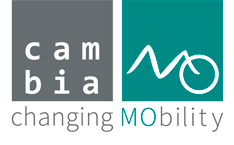Placing the attention on the data collection methods on travel users’ behaviors and their potential for detecting the intersectionality and the social minorities are some of the themes of the next TRB Standing Committee on Women & Gender in Transportation (AME20) Virtual Annual Meeting.
cambiaMO | changing MObility will be present at the meeting with our co-director Floridea Di Ciommo presenting the TRB paper: “Intersectionality as a Goal in Data Collection for Mobility Needs of Social Minorities” – Di Ciommo, F., A. Kirstein and G. Rondinella.
The presentation will be included in the following:
AME20 VIRTUAL ANNUAL MEETING AGENDA
- Welcome/Introductions
- Women’s Issues in Transportation (WIiT) 2024 Conference – update
- Critical Issues in Transportation — opportunity to contribute
- TRBAM — facilitated discussion on the impacts of a non-hybrid conference
- Triennial Strategic Plan — discussion
- Featured Research Presentation & Discussion — Intersectionality as a Goal in Data Collection for Mobility Needs of Social Minorities (Floridea Di Ciommo). Download the presentation here
- Committee Updates / Call for Volunteers.
When: Friday, January 28, 2022, from 17:00 to 19:00 CET (8 – 10 a.m. Pacific time)
Where: online by registering previously at this link
Meeting language: English
REFERENCE
Di Ciommo, F., Kilstein, A., & Rondinella, G. (2022). Intersectionality as a Goal in Data Collection for Mobility Needs of Social Minorities. Paper TRBAM-22-02662 at the 101st TRB Annual Meeting. January 9-13, 2022. Washington, DC.
ABSTRACT
This article places the attention on the data collection methods on travel users’ behaviors and their potential for detecting the intersectionality and the social minorities. When working with a quantitative approach, the sampling tends to achieve statistical significance by creating a sample selection that is representative of chosen characteristics of the population (such as gender, age, education, employment, ethnic identity etc). Intersectionality implies that multiple characteristics that are determining mobility decisions (such as being a women-caregiver, an older-impaired, etc.) may be simultaneously present in each individual. Intersectionality creates different needs in mobility, as well as different perceptions and behaviors. Going further, certain traits of specific disadvantaged groups in society appear, in numerical terms, as a marginal phenomenon, especially when they are crossed. The representative sample, the one that responds to a normal curve of population, is not appropriately capturing these intersectional traits, and thus underestimate certain issues that are of relevance for the affected population and that shape the inclusivity of a community and the universal principle of a service. For instance, trips related to the caregiving of an older-impaired person may be not identified in a sample or lack “reading base”, which utterly implies that the characteristics of this travel will be off the radar. This article presents a research project, INDIMO, as an illustration of intersectionality was developed, rendering a complex scenario where individuals are associated with multiple characteristics and an interpretation of the intersection provide the key elements for building-up universal Digital Mobility and delivery services.
Keywords: data representativeness, intersectionality, contextual data, relevance, social minorities needs, inclusion, equity






